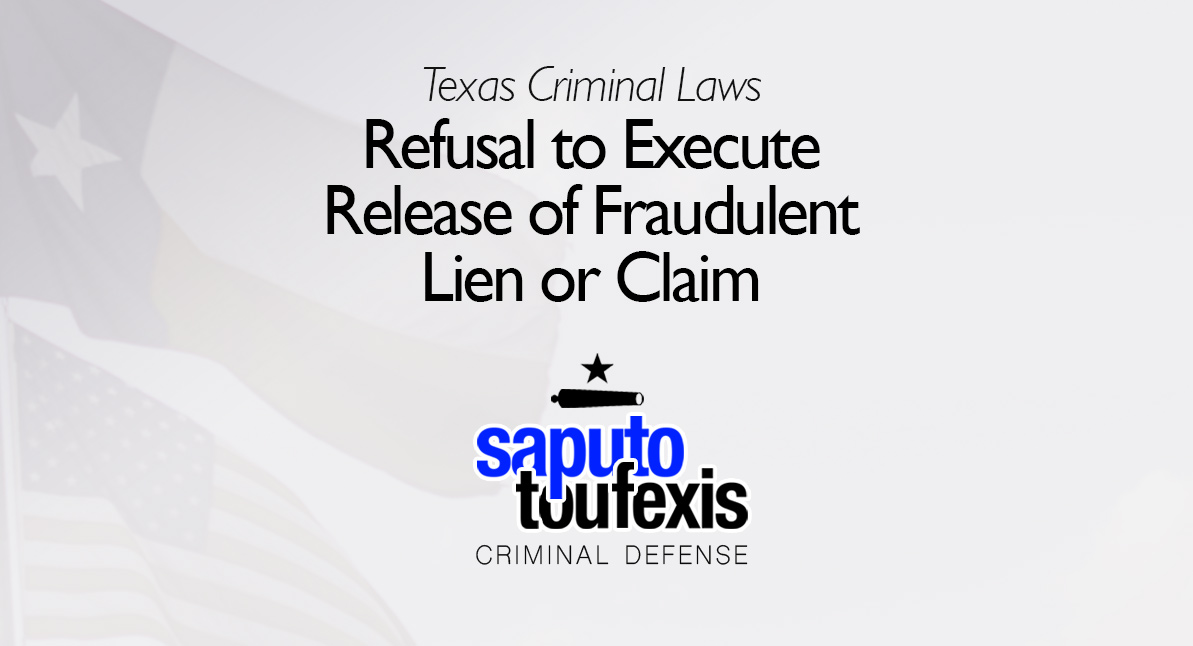The Texas Refusal to Execute Release of Fraudulent Lien or Claim law gives police the right to arrest you if they believe you owned or held a fraudulent lien or other claim on property and, after receiving a request the execution of a release of the fraudulent lien or claim, refused to release the claim with the intent to harm or defraud somene.
FAQs about the
Refusal to Execute Release of Fraudulent Lien or Claim law in Texas
- What is the current Texas law about Refusal to Execute Release of Fraudulent Lien or Claim?
- How can I be charged with a Refusal to Execute Release of Fraudulent Lien or Claim offense in Texas?
- What is the statute of limitation for Refusal to Execute Release of Fraudulent Lien or Claim in Texas?
- What is the penalty for a Texas Refusal to Execute Release of Fraudulent Lien or Claim offense?
- Can you get probation for Refusal to Execute Release of Fraudulent Lien or Claim in Texas?
- What level of crime is Refusal to Execute Release of Fraudulent Lien or Claim in Texas?
The law contains specific instructions that need to be followed in order for the request to be valid.
Have you been charged with Refusal to Execute Release of Fraudulent Lien or Claim? Contact us today to discuss legal representation.
or Text or Call (888) 239-9305
The Texas legislature codified this criminal offense in Texas Penal Code Section 32.49. The legislature did not update this law in 2023. In fact, this law has not been amended since 1997.
The Penal Code classifies the Texas Refusal to Execute Release of Fraudulent Lien or Claim law under Title 7 “Offenses Against Property,” Chapter 32 “Fraud.” Learn more about the Texas offense of Refusal to Execute Release of Fraudulent Lien or Claim below.
What is the current Texas law about Refusal to Execute Release of Fraudulent Lien or Claim?
Texas law currently defines the offense of Refusal to Execute Release of Fraudulent Lien or Claim in Penal Code Section §32.49 as follows:[1]
(a) A person commits an offense if, with intent to defraud or harm another, the person:
(1) owns, holds, or is the beneficiary of a purported lien or claim asserted against real or personal property or an interest in real or personal property that is fraudulent, as described by Section 51.901(c), Government Code; and
(2) not later than the 21st day after the date of receipt of actual or written notice sent by either certified or registered mail, return receipt requested, to the person’s last known address, or by telephonic document transfer to the recipient’s current telecopier number, requesting the execution of a release of the fraudulent lien or claim, refuses to execute the release on the request of:
(A) the obligor or debtor; or
(B) any person who owns any interest in the real or personal property described in the document or instrument that is the basis for the lien or claim.
How can I be charged with a Refusal to Execute Release of Fraudulent Lien or Claim offense in Texas?
You can be charged with Refusal to Execute Release of Fraudulent Lien or Claim in Texas if the state’s attorneys believe that each of the elements of 32.49(a) as described in the section above have been met.
What is the statute of limitation for Refusal to Execute Release of Fraudulent Lien or Claim in Texas?
As a misdemeanor, Refusal to Execute Release of Fraudulent Lien or Claim charges have a two-year limitations period.[2]
What is the penalty for a Texas Refusal to Execute Release of Fraudulent Lien or Claim offense?
A conviction for Refusal to Execute Release of Fraudulent Lien or Claim in Texas is punished as a Class A misdemeanor,[3] with a maximum possible fine under Texas state law of up to $4,000 and jail time of up to one year.
Can you get probation for Refusal to Execute Release of Fraudulent Lien or Claim in Texas?
The Texas Code of Criminal Procedure allows both judges and juries to grant probation for Refusal to Execute Release of Fraudulent Lien or Claim, and judges are also allowed to accept deferred adjudication plea deals.[4]
What level of crime is Refusal to Execute Release of Fraudulent Lien or Claim in Texas?
The Penal Code classifies the punishment for Refusal to Execute Release of Fraudulent Lien or Claim as a Class A misdemeanor.
Learn more about the penalty range for this offense in the section above.
Legal References:
^1. Texas Penal Code §32.49. This law is current as of 2024.^2. See Code of Criminal Procedure 12.02(a)^3. Texas Penal Code §32.49(c)^4. See Chapter 42, Texas Code of Criminal Procedure, Art. 42A.054, Art. 42A.056, Art. 42A.102










